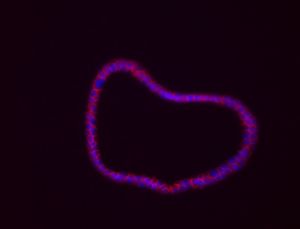La inflamación es una respuesta defensiva compleja del sistema inmunitario que se activa para proteger al organismo de estímulos dañinos e iniciar procesos de curación y regeneración. La inflamación crónica o patológica es también una de las causas relacionadas con el desarrollo del cáncer. Son muchos los equipos de investigación que actualmente están centrados en desentrañar el papel de la inflamación en el cáncer con el objetivo de buscar mejores terapias antitumorales.
En el trabajo, publicado en la revista Cancer Communications, los investigadores analizan los niveles de las proteínas p38γ y p38δ, reguladoras de la inflamación, así como su mecanismo de activación y los niveles de expresión de sus ARN mensajeros, en pacientes con enfermedad inflamatoria intestinal y cáncer colorrectal.
“Hemos observado que, en los pacientes enfermos, los niveles de p38δ disminuyen, mientras que los de p38γ aumentan, en particular la activación, causada por fosforilación, de esta proteína”, destaca Ana Cuenda, investigadora del Centro Nacional de Biotecnología (CNB-CSIC). “La detección de estos cambios en muestras de plasma facilitaría el empleo de estas proteínas como marcadores mediante biopsia líquida”, indica.
Pilar Fajardo, primera autora del trabajo y también investigadora del CNB-CSIC, destaca: “El aumento de los niveles de p38γ está relacionado con la expresión de proteínas implicadas en la inflamación y la respuesta inmunitaria, como IL-6 y CCL5, proteínas relacionadas con tumores, como MMP9 y TIMP1, y otras moléculas igualmente implicadas en procesos inflamatorios y en el desarrollo de cáncer”. “Esto sugiere que p38γ puede tener valor clínico para detectar el riesgo en etapa temprana y lograr mejorar las tasas de supervivencia”, asegura.
“El abordaje en esta investigación ha sido integral”, destacan Cuenda y Juan José Sanz-Ezquerro, investigador del CNB-CSIC, “pues hemos utilizado muestras humanas de plasma sanguíneo, se han analizado diferentes bases de datos de ARNm de pacientes humanos y hemos generado órganos miniaturizados u organoides derivados de tumores de pacientes, en colaboración con un equipo del Instituto de Investigaciones Biomédicas Alberto Sols (IIB-CSIC)”.
Además, los científicos han empleado un modelo de cáncer de colon asociado a colitis en ratón, donde han visto que, en ausencia de estas proteínas, los animales tienen menos inflamación y desarrollan menos tumores. En este modelo los resultados han sido similares a lo observado con muestras humanas, lo que refuerza la generalidad del mecanismo descrito.
Más información
Fajardo P, Taskova M, Martín-Serrano MA, Hansen J, Slott S, Jakobsen AK, Wibom ML, Salegi B, Muñoz A, Barbachano A, Sharma A, Gubatan JM, Habtezion A, Sanz-Ezquerro JJ, Astakhova K, Cuenda A. p38γ and p38δ as biomarkers in the interplay of colon cancer and inflammatory bowel diseases. Cancer Commun (Lond). 2022 Jul 7. DOI: 10.1002/cac2.12331.






